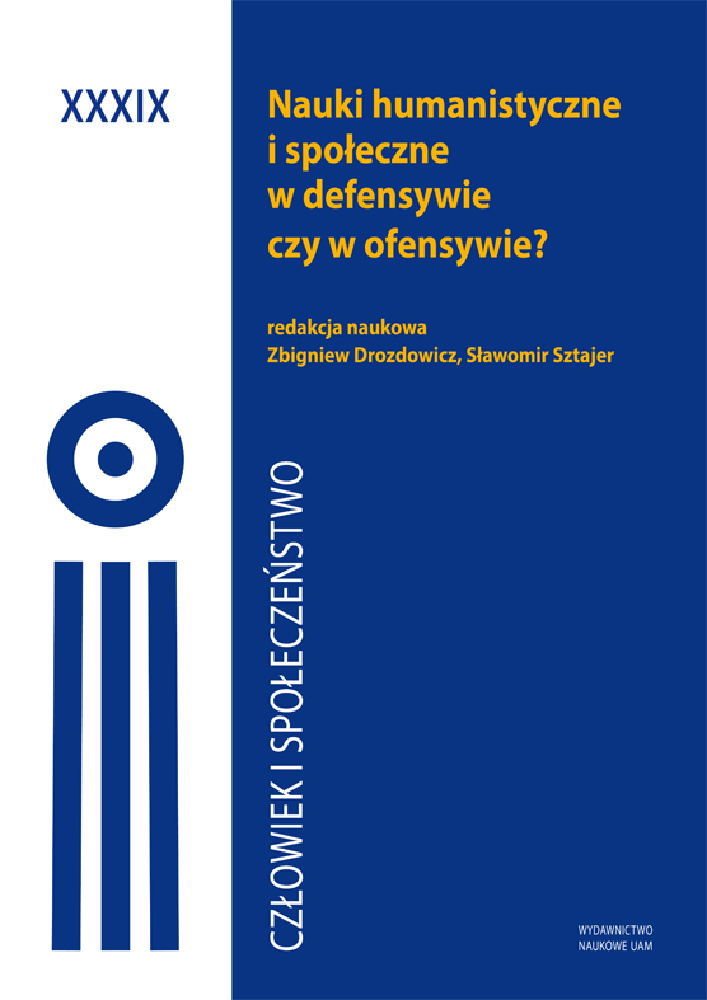Abstrakt
If we accept the distinction between sex and gender, introduced by the Second Wave of Feminism, and if we agree that gender does not have to be limited to two sexes, we will enter the terrain of the queer, the world of labile, liquid sexuality where the borders between men and women get blurred and the space opens for creating various human hybrids. In Poland, the middle of 1990 saw the launch of the women’s studies, gay and lesbian studies, gender studies, queer, LGBT, opening new domains and new methods of human studies. We can call them post-feminist and cultural studies because they stem from the feminist distinction between sex and gender and are focused on gender, i.e. on cultural rather than biological determinants of human beings. The new human sciences will have to face such new narratives of human beings, rethink the concept of objectivity (science) and commitment, learn to live in pluralistic world of many theories and more precisely many discourses, and to learn to cooperate with various groups to present their point of view. But first of all, the new human sciences will have to replace the idea of unity by idea of difference. Once we were looking for unity, now we are looking for difference.
Bibliografia
Bator J., Feminizm, postmodernizm, psychoanaliza. Filozoficzne dylematy feministek drugiej fali, słowo/obraz terytoria, Gdańsk 2001.
Beauvoir S. de, Druga płeć, t. I: Fakty i mity, tłum. G. Mycielska, Wyd. Literackie, Kraków 1972.
Beauvoir S. de, Druga płeć, t. II: Kształtowanie się kobiety, sytuacja, usprawiedliwienia i ku wyzwoleniu, tłum. M. Leśniewska, Wyd. Literackie, Kraków 1972.
Butler J., Uwikłani w płeć, tłum. K. Krasuska, Wyd. Krytyki Politycznej, Warszawa 2008.
Dziamski G., Sztuka feministyczna: od outsidera do innego, w: idem, Sztuka u progu XXI wieku, Wyd. Fundacji Humaniora, Poznań 2002.
Mead M., Płeć i charakter w trzech społecznościach pierwotnych, PIW, Warszawa 1986.
Mead M., Sex and Temperament in Three Primitive Societies, William Morrow, New York 1935.
Mizielińska J., Idee pogubione w czasie – polityka LGBT vs. teoria queer w Polsce i na Zachodzie, „Przegląd Kulturoznawczy” 2012, część B.
Radkiewicz M., Oblicza kina queer: od crossdressingu do filmów transgenderowych, „Przegląd Kulturoznawczy” 2012, część B.
Spivak G.Ch., Z pieczątką Kalkuty, tłum. J. Majmurek, w: S. Harasym (red.), Strategie postkolonialne, Wyd. Krytyki Politycznej, Warszawa 2011.
Ślęczka K., Feminizm. Ideologie i koncepcje społeczne współczesnego feminizmu, Książnica, Katowice 1999.
Tokarczuk O., Kobieta nie istnieje, wstęp do J. Butler, Uwikłani w płeć, tłum. K. Krasuska, Wyd. Krytyki Politycznej, Warszawa 2008.
Tomasik K., Potencjalna emancypacja, w: Homobiografie. Pisarki i pisarze polscy XIX i XX wieku, Wyd. Krytyki Politycznej, Warszawa 2009.
Licencja
1. W momencie złożenia pracy celem rozpoczęcia postępowania w sprawie publikacji, Licencjodawca, zwany dalej Autorem, akceptuje wszystkie zasady umieszczone na stronie internetowej czasopisma “Człowiek i Społeczeństwo”, udzielając Licencjobiorcy, zwanego dalej Wydawcą, niewyłącznej i nieodpłatnej licencji na korzystanie z Utworu. Licencja zakłada tym samym brak ograniczeń terytorialnych, czasowych oraz ilościowych na następujących polach eksploatacji (art. 50 ustawy z dnia 4 lutego 1994 r. o prawie autorskim i prawach pokrewnych):
a. utrwalanie Utworu;
b. zwielokrotnienie Utworu drukiem i w wersji cyfrowej;
c. wprowadzenie do obrotu, użyczenie lub najem oryginału/zwielokrotnionych egzemplarzy Utworu;
d. publiczne wykonanie, wystawienie, wyświetlenie, odtworzenie oraz nadawanie i reemitowanie, a także publiczne udostępnianie Utworu w taki sposób, aby każdy mógł mieć do niego dostęp w miejscu i w czasie przez siebie wybranym;
e. włączenie Utworu w skład utworu zbiorowego;
f. wprowadzenie Utworu w postaci elektronicznej na platformy elektroniczne lub inne wprowadzenie Utworu w postaci elektronicznej do Internetu, Intranetu, Extranetu lub innej sieci;
g. rozpowszechnianie Utworu w wersji elektronicznej w Internecie, Intranecie, Extranecie lub innej sieci, w pracy zbiorowej, a także samodzielnie w formule Open Access w oparciu o licencję Creative Commons Uznanie autorstwa 4.0 Międzynarodowa Licencja Publiczna (CC BY 4.0), a także inną wersję językową tej licencji, lub którąkolwiek późniejszą wersję tej licencji.
2. Założenia licencji Creative Commons Uznanie autorstwa 4.0 Międzynarodowa Licencja Publiczna (CC BY 4.0), udzielają Wydawcy upoważnienia do kopiowania, zmieniania, rozprowadzania, przedstawiania i wykonywania Utworu jedynie pod warunkiem uznania autorstwa.
3. Wraz z dostarczeniem Utworu, Autor zobowiązuje się do wypełnienia, podpisania oraz odesłania skanu umowy
